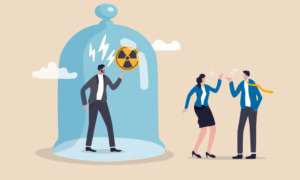The quiet rebellion over men at the YWCA began seven years ago in Olympia, Wash., and Tucson, Ariz.
In a move that could have gotten their organizations decertified by national headquarters, the boards of directors of the YWCAs in those cities defied an age-old and global Y policy: When it came to governance and membership, YWCAs were for women only.
Eventually, 18 more YWCAs in the United States had jumped on the bandwagon. So this past April, YWCA USA decided to let men join the organization’s 2.6 million female members and serve on both local and national boards.
The decision brings YWCA’s policy in line with most gender-specific youth groups that once banned members of the opposite sex from certain roles within their organizations.
“I’m a little surprised it held up as long as it did,” said one official from another gender-specific program. “I know a lot of local Y people that felt it was outdated. It didn’t make sense to me on the board level. That’s a group of people that need to have a wide range of experience.”
The decision was not without contention at the 148-year old YWCA. “It’s our history, our legacy” to be governed by women, says CEO Peggy Sanchez Mills. “Reports have demonstrated that when there’s a group of men, it’s a struggle at times for young girls to not defer to them.
“For a number of years, this has been an issue that YWCA has been exploring.”
When most gender-specific youth groups started, limiting certain leadership roles to members of the same sex was an instinctive no-brainer. Groups such as the Boy Scouts and Girl Scouts were formed to provide youth with role models of the same gender. And there were concerns that if males led groups of girls or visa versa, some of those leaders would engage in sexual activity with the youth.
Limiting membership on the boards of directors has had more to do with the organizational cultures and the belief that women were better suited to guide organizations that serve girls. Eventually, just about all of those policies have changed.
Examples
YMCA of the USA: The Brooklyn YMCA became the first to admit women members in 1859, eight years after the first American YMCA was established, according to the YMCA of the USA’s archives. The national YMCA adopted a gender-neutral membership policy in 1867, and in 1886 Ellen Brown became the first woman to head a local YMCA, in Buffalo, N.Y. Seventy-seven years later, the first woman joined the national board.
Boy Scouts of America (BSA): The BSA had prohibited women from serving as Scoutmasters since its inception in 1910. So when local Scout leaders named Catherine Pollard as Scoutmaster of a Connecticut troop in the 1970s, the national office rejected her, even though she had been essentially running the troop for some time. She sued, and the state Supreme Court ruled in 1987 that BSA was within its rights to ban her from that role.
But after Scouting established that right – and took lots of bad hits in the news media – the BSA national executive board unanimously voted seven months later to allow women to serve in all leadership positions.
Girls Inc.: The New York-based girls empowerment group says it has always had male board members since it was established under that name in 1945. “To my knowledge, there has never been any language in our bylaws that prevented men from serving on a board or staff, although the tradition up until 30 years ago was to have all-women staff,” says Susan Houchin, director of national programming. A male, Frank Burnes, served as national board chairman from 2000 to 2004.
Girl Scouts of the USA: It banned men as troop leaders from its founding in 1912, but eventually changed its policy. But the other troop leader – each troop is supposed to have two – must be female. The Girl Scouts says it has always allowed males on the board of directors.
Why Change
Among YWCAs, the attitude shift toward inclusion has been under way for years. The impetus for change in Tucson was the 1999 U.S. Supreme Court ruling that the BSA could exclude gays as members and leaders.
Executive Director Janet Marcotte of the Tucson YWCA served on a local task force that debated whether funders should support programs that discriminate over who can be members and volunteers. “Our position [at the Y] couldn’t be that we weren’t going to sanction funding of any organization that discriminated, and then say, ‘Oh by the way, we exclude men,’ ” Marcotte says.
That year, her Y and the one in Olympia alerted the national office that they would allow men on their boards. The Albuquerque, N.M., YWCA followed suit the next year.
Instead of reprimanding the organizations that bucked the national policy, the national board “approved a moratorium and said nobody would be disaffiliated for that reason while we debated it,” Mills says. By the time the policy came up for a vote this past April, 20 local YWCAs had amended their bylaws to include men.
The motion for the change was supported by 72 percent of the delegates from the YWCA’s 291 organizational members, according to the national office.
Men were already allowed to work for the organization and sit on advisory committees or boards of trustees.
Now each local YWCA can amend its own bylaws to include men as members, enabling them to attend meetings, vote on potential board candidates and serve on those boards. The local organizations are also free to remain female-only.
Aside from Marcotte’s concern about hypocrisy in Tucson, what why did so many YWCAs go along with the change? Improving conditions for women are a big reason, Mills says.
“We were founded simply because of a lack of equity for women,” she says. Today, she says, many YWCA leaders believe their communities have “reached parity, with women in high-ranking positions elsewhere in the region, and that it’s time to broaden the agenda.”
Also, some funders had commented to local YWCAs on the lack of male leaders. The YWCA of Greater Portland, Ore., was denied funding from the Children’s Trust Account, which had previously supported the organization but adopted nondiscrimination policies for grantees, according to Greater Portland’s associate executive director, Kathryn Cooney. The Greater Portland Y amended its local bylaws to allow male members in 2004, she says.
Mills says she knows of no case where a Y’s funding was cut off because of the policy. “There was definitely dialogue at the lower level” among funders and affiliates, she says, but the affiliates “could explain it as part of national rules.”
Despite what seems to be an inevitable evolution, some small, community-based organizations maintain one-gender governance. San Francisco’s Center for Young Women’s Development, which helps young women in crisis, operates without a male on its staff or board of directors.
The center has “never even thought of having men on our staff,” says Executive Director Marlene Sanchez, but the board has discussed adding male colleagues.
“We feel strongly about having a board that values the voices of young women,” Sanchez says. “We have some struggles in ideology now, but we don’t have that gender struggle. And we felt really good about keeping it that way for now.”






























